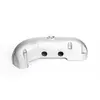Mobile:+86-311-808-126-83
Email:info@ydcastings.com
Methods for Effective Cleaning and Maintenance of Marine Exhaust Manifolds for Optimal Performance
Cleaning Marine Exhaust Manifolds A Comprehensive Guide
Maintaining the integrity and performance of marine engines is crucial for boat operators and enthusiasts alike. One key area that often requires attention is the exhaust manifold, a critical component that plays a vital role in the engine's overall efficiency. As marine engines face the harsh conditions of saltwater and complex exhaust systems, cleaning the exhaust manifolds becomes essential for ensuring longevity and optimal performance.
Understanding Exhaust Manifolds
The exhaust manifold is responsible for collecting exhaust gases from multiple cylinders and directing them to the exhaust system. In marine applications, these manifolds must withstand high levels of heat and corrosion due to exposure to saltwater and exhaust gases, which can lead to inefficiencies and mechanical failures over time. If not properly maintained, exhaust manifolds can become clogged with soot, salt, and other contaminants, impacting engine performance and increasing emissions.
Importance of Regular Cleaning
Regular cleaning of marine exhaust manifolds serves several important purposes
1. Prevention of Corrosion Salt and other environmental factors can cause rust and corrosion on the manifold surface. Cleaning helps to remove these harmful elements and extend the life of the manifold.
2. Improved Engine Performance A clean manifold allows for better gas flow, which improves engine performance and fuel efficiency. Clogged manifolds can lead to poor throttle response and decreased acceleration.
cleaning marine exhaust manifolds

4. Cost Efficiency Regular maintenance, including cleaning, can prevent costly repairs down the line. Neglecting the exhaust system can lead to serious issues that require significant time and financial resources to fix.
Cleaning Techniques
Cleaning marine exhaust manifolds can be achieved through several methods, depending on the level of buildup and the type of materials used in the manifolds.
1. Chemical Cleaning Using specialized marine cleaning solvents can effectively dissolve carbon deposits and other buildups. Always follow the manufacturer’s instructions regarding dilution and application.
2. Manual Cleaning For significant buildup, manual cleaning may be necessary. This process includes removing the manifold from the engine and scrubbing it with appropriate brushes and cleaning agents. This method allows for deep cleaning but requires mechanical knowledge and tools.
3. High-Pressure Water Jetting In some cases, high-pressure water jetting can effectively dislodge stubborn deposits. This method requires professional service but can be very effective for thorough cleaning.
4. Routine Inspections Regularly inspect the exhaust manifold for signs of corrosion, cracks, or buildup. Catching issues early on can save time and money.
Conclusion
Cleaning marine exhaust manifolds is an essential aspect of boat maintenance that should not be overlooked. By keeping these components free of buildup and corrosion, boaters can enhance their vessel's performance, ensure environmental compliance, and prevent costly repairs. With a clear understanding of the importance of clean exhaust manifolds and the techniques available, boat operators can take proactive steps to ensure the longevity and efficiency of their marine engines. Regular checks and cleanings will not only enhance the overall boating experience but also contribute to the care of our marine environments.
-
Why Should You Invest in Superior Pump Castings for Your Equipment?NewsJun.09,2025
-
Unlock Performance Potential with Stainless Impellers and Aluminum End CapsNewsJun.09,2025
-
Revolutionize Your Machinery with Superior Cast Iron and Aluminum ComponentsNewsJun.09,2025
-
Revolutionize Fluid Dynamics with Premium Pump ComponentsNewsJun.09,2025
-
Optimizing Industrial Systems with Essential Valve ComponentsNewsJun.09,2025
-
Elevate Grid Efficiency with High-Precision Power CastingsNewsJun.09,2025











